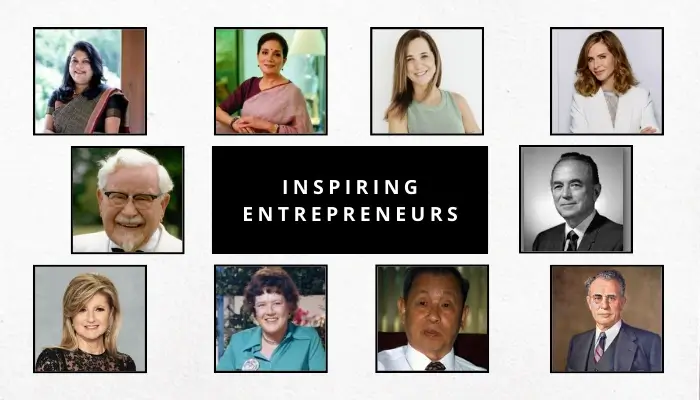In the world of startups, youth often take the spotlight. We hear about college dropouts building billion-dollar empires before 30, and the media always shows these young tech people as heroes. But reality tells another story: many of the most impactful businesses were founded by inspiring entrepreneurs who started their journeys later in life — often at age 50 or beyond. These second-act founders bring decades of experience, resilience, and vision to their new business ventures. Their stories surely prove that entrepreneurship has no age barriers and show that business success can come at any stage of life.
This article explores some of the most notable inspiring founders who launched businesses at age 50 or later, across industries such as beauty, food, retail, and media. Their journeys are inspiring case studies of reinvention, persistence, and the idea that it is never too late to chase a dream.
Also Read: Women Leaders Powering Sustainability in Energy and Climate
1. Falguni Nayar — Nykaa (Founded at 50)
Falguni Nayar, a former investment banker, left her high-profile job at Kotak Mahindra Capital to pursue entrepreneurship at age 50. In 2012, she founded Nykaa, an online beauty and lifestyle marketplace that has since transformed India’s retail landscape.
Nayar recognized the untapped opportunity in India’s beauty sector. Nykaa began as an e-commerce platform but grew into a powerhouse, with physical stores, private labels, and a thriving online community. In 2021, Nykaa’s IPO made her India’s richest self-made woman. She became the top woman entrepreneur in the country.
Her story highlights how decades of corporate work experience can provide the strategic insight and network needed to scale a business quickly. More importantly, it shows that passion combined with timing can redefine entire industries.
2. Mira Kulkarni — Forest Essentials (Founded in her 50s)
Luxury Ayurveda is a booming sector today, but back when Mira Kulkarni founded Forest Essentials, the idea of premium Ayurvedic skincare products was novel. Starting in her 50s, Kulkarni turned a small venture into a global brand. Eventually, Estée Lauder acquired a stake, further validating its potential.
Her approach combined authentic Indian traditions with luxury packaging and international quality standards. Regarding the method, she mixed traditional Indian ways with high-quality packaging and global standards. Forest Essentials is now sold worldwide, embodying the blend of heritage and modernity. Kulkarni’s journey is proof that cultural authenticity and midlife entrepreneurship can lead to global success.
3. Sonsoles Gonzalez — Better Not Younger (Founded at 52)
After decades at Procter & Gamble and L’Oréal, Sonsoles Gonzalez noticed that the beauty industry overlooked older women. At 52, she launched Better Not Younger, a pro-age haircare brand designed specifically for women experiencing the changes of midlife.
Her brand rejects “anti-aging” rhetoric and instead embraces vitality and confidence at every stage of life. With clean formulas and inclusive messaging, Better Not Younger filled a glaring gap in the beauty market. Gonzalez’s story underscores how personal experience, combined with industry expertise, can spark powerful second-act entrepreneurship.
4. Trinny Woodall — Trinny London (Founded in her 50s)
British fashion and television personality Trinny Woodall reinvented herself as a beauty entrepreneur in her 50s with the launch of Trinny London. The brand is built on stackable makeup pots and personalized digital shopping tools, making it especially appealing to women seeking simplicity and efficient beauty products.
Her brand’s pro-age messaging resonates globally, offering products that adapt to the needs of women in midlife and beyond. Woodall’s journey demonstrates how reinvention is possible at any stage, especially when authenticity drives innovation.
5. Colonel Harland Sanders — Kentucky Fried Chicken (Franchised at 62)
No list of late-blooming entrepreneurs is complete without Colonel Harland Sanders. At 62, after a lifetime of odd jobs and running a small roadside café, Sander’s cooking knowledge to expand the chicken recipe through a franchise system. His creation, Kentucky Fried Chicken (KFC), became one of the world’s largest fast-food franchises.
Sanders’ story is one of resilience. He faced countless rejections before securing his first franchise partner. Today, the Colonel’s image remains one of the most recognized in global branding.
6. Ray Kroc — McDonald’s (Franchised at 52)
When Ray Kroc first encountered the McDonald brothers’ hamburger stand at age 52, he saw more than just a restaurant. He saw the blueprint of a scalable business model. Kroc acquired the franchise rights and built McDonald’s into the world’s most iconic fast-food chain.
His relentless drive and vision transformed McDonald’s into a global empire. Kroc’s journey proves that identifying potential in an existing concept and scaling it can be as entrepreneurial as inventing something entirely new.
7. Arianna Huffington — The Huffington Post (Founded at 55)
Media mogul Arianna Huffington co-founded The Huffington Post at 55. Despite entering a crowded media space, HuffPost redefined digital journalism with its blend of blogs, news, and commentary. The platform was later sold to AOL for $315 million.
Huffington’s second act did not stop there. She later founded Thrive Global; a wellness startup focused on reducing stress and burnout — again leveraging personal experience into a new business opportunity.
8. Leo Goodwin — GEICO (Founded at 50)
Leo Goodwin founded GEICO (Government Employees Insurance Company) at 50 with his wife Lillian. Starting from scratch during the Great Depression, they created a business model that targeted federal employees and military personnel with low-cost auto insurance.
GEICO grew steadily, eventually becoming one of America’s largest insurance companies. Goodwin’s story illustrates how persistence and niche targeting can overcome even the most challenging economic climates.
9. Chaleo Yoovidhya — Red Bull (Launched in his 50s)
Thai entrepreneur Chaleo Yoovidhya created an energy drink formula in his 50s. Teaming up with Austrian businessman Dietrich Mateschitz, he launched Red Bull in the 1980s. What began as a niche tonic became a global phenomenon, pioneering the energy drink category.
Chaleo’s story highlights how cross-cultural partnerships and bold marketing can redefine entire industries — and how age is no barrier to disruptive innovation.
10. Julia Child — Chef, Author, TV Personality (First cookbook at 50)
Julia Child was 50 when she published her first cookbook, Mastering the Art of French Cooking. This milestone launched her career as a beloved chef and television personality. Child brought French cuisine to American households and became a cultural icon.
Her journey is a reminder that passion projects pursued later in life can blossom into influential careers with lasting cultural impact.
Also Read: Work Like a Girl: Empowering Women in Their Careers
Why Starting After 50 Works
These stories come from different industries and time periods, but they show similar patterns. The common themes are quite clear when we look at all of them together:
Experience as capital — Founders in their 50s and beyond bring decades of knowledge, networks, and resilience.
Clearer vision — With maturity comes clarity about what truly matters — solving meaningful problems instead of chasing trends.
Financial stability — Many older founders have savings or career earnings to help fund their ventures. Their accumulated wealth provides better financial stability for business operations.
Authenticity — Products built from lived experience (like Gonzalez’s haircare or Nayar’s Nykaa) customers connect with them the same way because they understand the actual problems.
Conclusion
Entrepreneurship is not a young person’s game — it is a human pursuit that thrives on courage, creativity, and resilience. From Falguni Nayar redefining India’s beauty market to Colonel Sanders creating a global food empire at 62, these inspiring entrepreneurs prove that age is no barrier to innovation.
If anything, starting later can be an advantage. With wisdom, patience, and perspective, entrepreneurs over 50 often build businesses that are both profitable and deeply purposeful. For anyone standing at life’s crossroads, these stories are a reminder: it is never too late to start. The best chapters may be written after 50. When wisdom and maturity combine to create extraordinary opportunities, this phase allows individuals to pursue their true passions with greater clarity and purpose than ever before.



